CONTEXT
In Burma (Myanmar), more than 700,000 Rohingya Muslims from Rakhine state have been forced to flee as a result of what the UN human rights chief is calling a “textbook example of ethnic cleansing”. Genocide and crimes against humanity including murder, rape, torture, sexual slavery, persecution and enslavement of Rohingya people have been widely reported, and this violence is far from new; the Rohingya have endured persecution, violence, and diminishing human rights for decades. Yet the Burmese government has time and time again failed to address these gross violations of human rights.
Given the unwillingness and inability of the Burmese government to de-escalate the situation and protect the Rohingya, it is likely that accountability will only be achieved via action by the international community. In September 2018, the UN Fact Finding Mission (FFM) on Myanmar submitted a 444-page report describing the atrocities to the UN, resulting in the establishment of an Independent Mechanism (IM) to collect, consolidate, preserve and analyze evidence of the most serious international crimes and violations for future accountability proceedings, whenever they may be. The IM on Myanmar is currently in formation and is a positive step towards accountability; however, the UN has also recently acknowledged its own dysfunctions and “systemic failures” at dealing with the Rohingya situation. Meanwhile, the Prosecutor’s Office of the International Criminal Court (ICC) has sought authorization to investigate the deportation of Rohingya to Bangladesh (which is a party to the Rome Statute) and potentially other crimes that have partially occurred in Bangladesh. So, while the international community is taking action, the process has been imperfect and slow-going.
While we wait for these mechanisms to fall into place, Rohingya people have been and are continuing to share videos on Facebook, YouTube, Twitter, and WhatsApp, showing villages being burned, dead bodies, and people leaving their homes. If it is even uploaded at all (a significant amount of documentation is not shared anywhere, and resides on individuals’ phones), this visual evidence risks being taken down by platforms because its graphic content is not contextualized sufficiently for moderators, or due to malicious take-down requests; becoming unfindable in the sea of untagged information; or being lost because no one downloaded it before it expired or was deleted.
MISSION AND VISION
The Rohingya Genocide Archive (RGA) is a Rohingya-led initiative that systematically collects and preserves audiovisual documentation of atrocities against the Rohingya. It aims for the documentation to serve as evidence against military and government narratives, to corroborate other eyewitness accounts, and ultimately to be used in advocacy and legal settings to achieve accountability and justice for the Rohingya people.
Currently, RGA engages with international stakeholders who it hopes can find, access, and analyze the collection for the purposes of expediting criminal proceedings under international law, and for advocacy purposes. RGA also engages with Rohingya stakeholders to offer a trusted repository where their documentation can be preserved and used to further the Rohingya cause.
In the long term, RGA envisions a future when Rohingya people can safely, voluntarily, and with dignity return to their homes in Rakhine state; when they can live their lives on their land in safety and freedom from persecution; when they have their basic universal human rights, and their rights as full citizens restored. It is only with these fundamental rights and freedoms that the Rohingya people can achieve their full potential.
As part of this long-term vision, RGA envisions eventually becoming the flagship of a larger, national “Rohingya Archive,” a broad collection of primary source materials that document not only the genocide, but also the long history of the Rohingya people in Burma, their social customs, and rich cultural heritage. Throughout the world, archives play an important role as holders of memory and history that bind a society together. This is especially true in the context of a people who have been forcibly separated, whose land and artefacts have been systematically pillaged, and whose history has been denied by oppressors.
Key to the immediate goals and long-term vision of RGA is that it is staffed and led by Rohingya people. From a logistical perspective, it is plain that deep knowledge of the Rohingya context is necessary to adequately identify, understand, describe, and classify the materials. From a wider ethical standpoint, archives, as a locus of power and information, must belong to and be embedded in the communities that they document. The Rohingya people must have ownership of their representations and have control of their narrative.
Beyond Burma, RGA offers itself as a model for other marginalized communities to start their own archives from the ground up. The tools and workflows RGA employs are designed with minimal financial and technological resources in mind. RGA plans to share its documentation openly and widely, along with basic training resources. It is possible, armed with RGA’s workflows, a computer, some hard drives, some open-source and free tools, and internet access, for anyone to replicate RGA’s process.
HISTORY
The Rohingya Genocide Archive (RGA) was established in 2018 through a partnership between Rohingya Vision TV, a leading Rohingya-led media organization, and WITNESS, an international nonprofit organization that helps people use video and technology to protect and defend human rights. It emerged in response to an urgent need to preserve first-hand documentation of atrocities perpetrated against Rohingya in Rakhine State, especially in the aftermath of the genocide in August 2017 in which thousands of Rohingya were brutally massacred with impunity.
RGA is staffed by a Rohingya archivist who has expertise in the region and first-hand knowledge of the situation, and who has been trained in internationally accepted archival standards and practices by WITNESS. RGA’s archival workflows were designed with transparency and sustainability in lower-resourced environments in mind, relying entirely on free open-source software and hardware that can be easily obtained and managed. From the beginning, RGA has been strongly supported by Rohingya Vision TV and WITNESS, which have provided the archive with connections to key Rohingya documenters and international stakeholders, organizational support, consultation, as well as office space and technical equipment.
IMPACT
To date, RGA has preserved and cataloged over 629 videos that have been individually reviewed and selected by the Rohingya archivist from online sources, Rohingya Vision TV’s citizen journalists, and individual documenters with whom RGA has built relationships. Some of this material has never been made public, and some no longer exists on online sources. Despite what has been preserved to date, RGA is aware that vast troves of documentation are still uncollected, stored offline on the phones and thumbdrives of itinerant refugees without reliable internet access, and is seeking innovative ways to collect this information.
In the past four years, RGA has strengthened and expanded its connections to key documenters and activists in the Rohingya community, both within Rakhine State and in the diaspora. The trust that has been earned in the Rohingya community is the result of tireless grassroots outreach and relationship-building led by the Rohingya archivist, Rohingya Vision TV, and WITNESS.
RGA has also built connections with important international stakeholders and justice mechanisms.
ACKNOWLEDGMENT
RGA would like to thank the Rohingya Vision Team for its support throughout the journey and the WITNESS team for their guidance and support.
We would especially like to thank the Rohingya organizations, activists, advocates, journalists, archivists, other Rohingya media and information groups for their continuous support in providing guidance and evidentiary materials.
We also would like to thank our archive consultant, international advocates, human rights defenders and every individual who has ever supported RGA.





